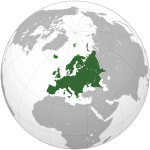Swídìn
Ìrísí
Kingdom of Sweden Konungariket Sverige
| |
|---|---|
Orin ìyìn: [Du gamla, Du fria] error: {{lang}}: text has italic markup (help)[b] Thou ancient, thou free | |
![Ibùdó ilẹ̀ Swídìn (dark green) – on the European continent (light green & dark grey) – in the European Union (light green) — [Legend]](http://upload.wikimedia.org/wikipedia/commons/thumb/0/06/EU-Sweden.svg/250px-EU-Sweden.svg.png) Ibùdó ilẹ̀ Swídìn (dark green) – on the European continent (light green & dark grey) | |
| Olùìlú àti ìlú tótóbijùlọ | Stockholm |
| Àwọn èdè ìṣẹ́ọba | Swedish[c] |
| Àwọn ẹ̀yà ènìyàn | 82.1% Swedish[1] 5.1% Finns [2] 12.8% other (2008)[3][4] |
| Orúkọ aráàlú | Swedish or Swedes |
| Ìjọba | Parliamentary democracy and Constitutional monarchy |
• Monarch | King Carl XVI Gustaf |
| Ulf Kristersson (M) | |
| Andreas Norlén (M) | |
| Consolidation | |
| 1397 | |
• de facto independent kingdom | June 6, 1523 |
• end of Scandinavian union ratified | 1524 |
• Swedish-Norwegian Union begins | November 4, 1814 |
• Swedish-Norwegian Union ends | August 13, 1905 |
| 1974 | |
| Ìtóbi | |
• Total | 450,295 km2 (173,860 sq mi) (55th) |
• Omi (%) | 8.37 (as of 2015)[5] |
| Alábùgbé | |
• February 2021 estimate | Àdàkọ:IncreaseNeutral 10,402,070[6] (88th) |
• Ìdìmọ́ra | 25/km2 (64.7/sq mi) (198th) |
| GDP (PPP) | 2020 estimate |
• Total | ▲ $563.882 billion[7] (39th) |
• Per capita | ▲ $52,477[7] (16th) |
| GDP (nominal) | 2020 estimate |
• Total | ▼ $528.929 billion[7] (23rd) |
• Per capita | ▼ $50,339[7] (12th) |
| Gini (2020) | low |
| HDI (2019) | ▲ 0.945[9] very high · 7th |
| Owóníná | Swedish krona (SEK) |
| Ibi àkókò | UTC+1 (CET) |
• Ìgbà oru (DST) | UTC+2 (CEST) |
| Irú ọjọ́ọdún | yyyy-mm-dd, d/m yyyy, dd-mm-yyyy, dd-mm-yy |
| Ojúọ̀nà ọkọ́ | right[d] |
| Àmì tẹlifóònù | 46 |
| Internet TLD | .se[e] |
a. ^ [För Sverige - I tiden] error: {{lang}}: text has italic markup (help) has been adopted by Carl XVI Gustaf as his personal motto.
b. ^ [Du gamla, Du fria] error: {{lang}}: text has italic markup (help) has never been officially adopted as national anthem, but is so by convention. c. ^ Since July 1, 2009[10][11] Five other languages are officially recognized as minority languages.[12] They are: d. ^ Since 3 September 1967. e. ^ The .eu domain is also used, as it is shared with other European Union member states. The .nu domain is another commonly used top-level domain ("nu" means "now" in Swedish). | |
Swídìn tabi Sweden je orile-ede ni Europe.

|
Àyọkà yìí tàbí apá rẹ̀ únfẹ́ àtúnṣe sí. Ẹ le fẹ̀ jù báyìí lọ tàbí kí ẹ ṣàtúnṣe rẹ̀ lọ́nà tí yíò mu kúnrẹ́rẹ́. Ẹ ran Wikipedia lọ́wọ́ láti fẹ̀ẹ́ jù báyìí lọ. |
Itokasi
[àtúnṣe | àtúnṣe àmìọ̀rọ̀]- ↑ "Befolkningsstatistik". www.scb.se. Retrieved 2009-06-16.
- ↑ http://en.wikipedia.org/wiki/Sweden_Finns
- ↑ "Summary of Population Statistics 1960 - 2008 (corrected version 2009-05-13)". www.scb.se. 2009-05-13. Retrieved 2009-07-08.
- ↑ Note that Swedish-speaking Finns or other Swedish-speakers born outside Sweden might self-identify as Swedish despite being born abroad. Moreover, people born within Sweden may not be ethnic Swedes.
- ↑ "Surface water and surface water change". Organisation for Economic Co-operation and Development (OECD). Retrieved 11 October 2020.
- ↑ [1] Statistics Sweden. Retrieved 8 July 2021.
- ↑ 7.0 7.1 7.2 7.3 "World Economic Outlook Database, October 2019". IMF.org. International Monetary Fund. Retrieved 4 December 2021.
- ↑ "Gini coefficient of equivalised disposable income – EU-SILC survey". ec.europa.eu. Eurostat. Retrieved 4 December 2021.
- ↑ Human Development Report 2020 The Next Frontier: Human Development and the Anthropocene. United Nations Development Programme. 15 December 2020. pp. 343–346. ISBN 978-92-1-126442-5. http://hdr.undp.org/sites/default/files/hdr2020.pdf. Retrieved 4 December 2021.
- ↑ "Språklagen" (PDF). Språkförsvaret (in Swedish). 2009-07-01. Archived from the original (PDF) on 2010-08-19. Retrieved 2009-07-15.
- ↑ Landes, David (2009-07-01). "Swedish becomes official 'main language'". The Local. thelocal.se. Retrieved 2009-07-15.
- ↑ "Är svenskan också officiellt språk i Sverige?" (in Swedish). Språkrådet (Language Council of Sweden). 2008-02-01. Archived from the original on 2014-02-06. Retrieved 2008-06-22.



